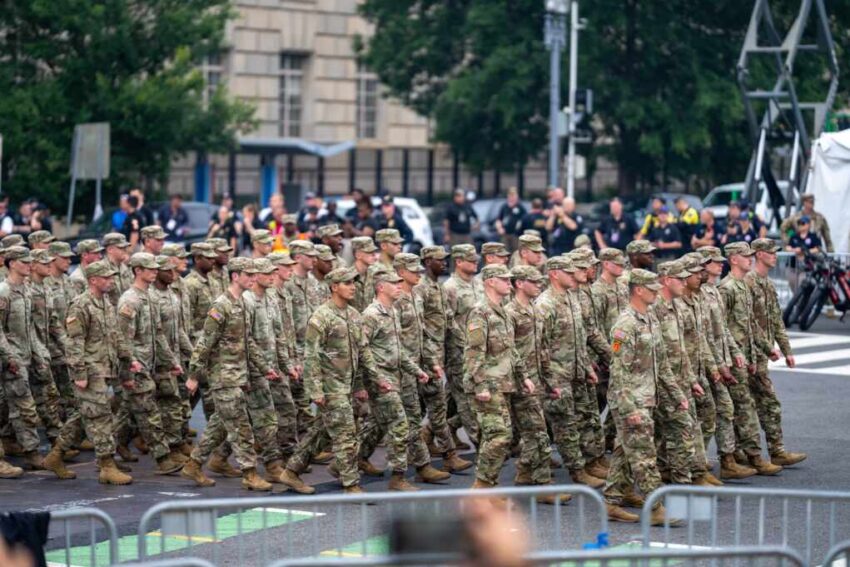A deputy commanding general testified that military forces assisting immigration raids in Los Angeles were permitted to take some law-enforcement actions despite legal limits on using the military as a domestic police force, raising fresh questions about compliance with the Posse Comitatus Act and the scope of presidential authority to deploy troops in civil contexts.
Story Overview
- Trial begins to assess legality of military’s role in LA raids under Trump administration.
- Testimonies suggest the military performed law-enforcement tasks, sparking constitutional concerns.
- California challenges federalization of the National Guard, citing the Posse Comitatus Act.
- Over 5,000 troops were deployed, leading to legal and public scrutiny.
Military Deployment and Legal Challenges
The trial over the federalization of California National Guard by President Trump during immigration enforcement operations in Los Angeles has commenced. The case centers around whether the deployment crossed into unlawful domestic policing, violating the Posse Comitatus Act. This act traditionally prohibits military involvement in domestic law enforcement, but the scope of presidential authority remains under scrutiny.
During the operations in June 2025, the presence of military troops in Los Angeles sparked significant legal concerns. The operations involved over 5,000 troops and incorporated 170 missions across nine federal agencies. Testimonies suggested that troops were allowed to perform certain law-enforcement actions, such as brief detentions, which have raised questions about adherence to legal boundaries.
Trump v. Newsom, Trial Over LA Guard Deployment, Starts | https://t.co/igEaydfuNT https://t.co/LN7Ym2ZT3S
— ConservativeLibrarian (@ConserLibrarian) August 11, 2025
State and Federal Tensions
The deployment under Title 10 federalized the California National Guard, shifting control from the state to federal command. This move intensified the conflict between state and federal authorities, with California Governor Gavin Newsom challenging the legality of the federalization. The state argues that these actions undermine its control and violate the Posse Comitatus Act.
California’s lawsuit seeks to block the use of troops for law enforcement tasks, emphasizing the need to maintain state sovereignty and ensure civil liberties. The case highlights ongoing tensions between federal mandates and state governance, particularly in high-stakes scenarios like immigration enforcement.
Implications and Future Considerations
The outcome of this trial could set a precedent for future military involvement in domestic issues. If the court finds the deployment unlawful, it could restrict federal authority in similar contexts and reinforce the boundaries set by the Posse Comitatus Act. Conversely, a ruling in favor of the federal government might expand the scope of military support roles in domestic law enforcement.
Stakeholders, including immigrant communities and civil rights advocates, closely monitor the proceedings. The trial’s decision will likely impact policies on state-federal relations, military deployments, and immigration enforcement, shaping the dialogue around constitutionality and civil liberties in the United States.
The broader implications of this case could prompt revisions in law enforcement-military cooperation protocols and training, emphasizing the need for clear guidelines and legal frameworks to govern such deployments. As the trial unfolds, its findings will contribute to the ongoing debate about the balance between national security and constitutional protections.
Sources:
June 2025 Los Angeles protests (sequence, detentions)
ABC News: US troops on the ground in LA operation; ROE allowing brief detentions of threats; numbers and assets
Democracy Docket: trial brief, Pentagon figures, multi-agency mission scope, Operation Excalibur, detention instance, expert commentary on Posse Comitatus
CalMatters: trial preview and stakes; state challenge context
CalMatters explainer on identifying actors in California immigration raids
Click this link for the original source of this article.
Author: Editor
This content is courtesy of, and owned and copyrighted by, https://conservativeamericatoday.com and its author. This content is made available by use of the public RSS feed offered by the host site and is used for educational purposes only. If you are the author or represent the host site and would like this content removed now and in the future, please contact USSANews.com using the email address in the Contact page found in the website menu.








